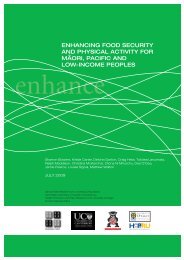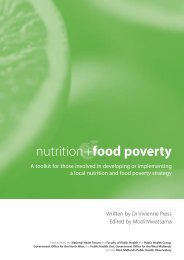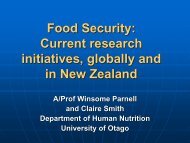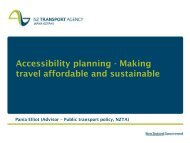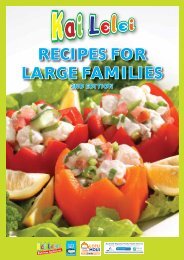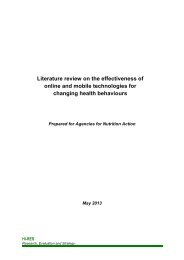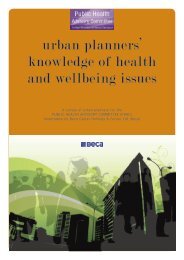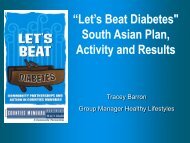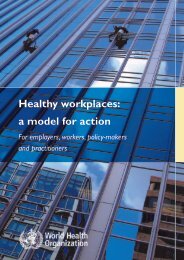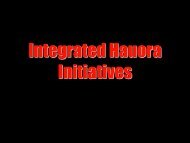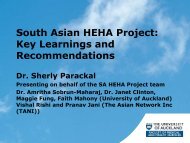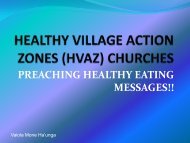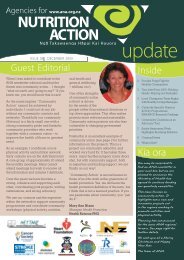Katherine Zhang and Wayne Reid
Katherine Zhang and Wayne Reid
Katherine Zhang and Wayne Reid
You also want an ePaper? Increase the reach of your titles
YUMPU automatically turns print PDFs into web optimized ePapers that Google loves.
Nutritional Issuesamongst Migrants <strong>and</strong>Refugees to Canterbury<strong>Wayne</strong> <strong>Reid</strong>, Ethnic Liaison Manager<strong>Katherine</strong> <strong>Zhang</strong>, DietitianPartnership Health CanterburyANA Nutrition & Physical Activity ForumChristchurch, 29 July 2010
80.0%70.0%60.0%50.0%40.0%30.0%20.0%10.0%0.0%12.7%BMI < 25BMI 25-30BMI > 3080.0%70.0%60.0%50.0%40.0%30.0%20.0%10.0%0.0%50.3%BMI < 25BMI > 25BMI > 30
Outline• Nutritional Needs Assessment of East AsiansLiving in Christchurch• Objectives• Methodology• Results• Chinese Cooking Programme
Objectives• Eating behaviour, influencing factors <strong>and</strong> associated healthissues• Healthy eating knowledge, practice of label reading <strong>and</strong> access toexisting nutritional resources <strong>and</strong> programmes.• Main nutritional needs• Health professionals’ needs• Recommendations on required nutritional resources <strong>and</strong> servicesTarget population: Chinese, Korean <strong>and</strong> Japanese (East Asians)
Methodology• Focus groups• 3 Chinese groups• 2 Korean groups• 1 Japanese group• Interviews• 9 interviews
Results I• Eating behaviour• Westernised breakfast• Both traditional food <strong>and</strong> western food for lunch• Traditional food for dinnerTraditional DietWestern Diet
Results I• Influencing factors• Availability• Cost• Time• Age• Taste preference• Transportation• Resettlement stress• Relationships• Living situation
Results I• Nutritional needs <strong>and</strong> recommendations• Nutrition resources• Language <strong>and</strong> culture• Content• Healthy eating• Unfamiliar local food• Recipe book• Where to buy• Type of resources
Results I• Nutritional needs <strong>and</strong> recommendations• Group activities• Nutrition education sessions• Supermarket tours• Cooking classes• Migrants’ group meeting
Results I• Nutritional needs <strong>and</strong>recommendations• Food safety surveillance<strong>and</strong> regulations• Homestay <strong>and</strong> parents• Physical activity
Results II• Young people• Awareness, cooking skills, time, convenience, cost,fast food• Alcohol <strong>and</strong> fizzy drink consumption• Physical activity• Rapid weight gain• Anorexia
Results II• East Asian’s nutritional needs• Nutrition resources <strong>and</strong> services• Nutrition education• Asian workforce development• Asian Health service
What has happened…‘From Cooking Skills to Life Skills’Chinese cooking programme
Course Outline• 6 sessions1 What is food: what should I be eating?2 Fuelling the body: why should I be eating it?3 Quick, easy <strong>and</strong> healthy4 Beans <strong>and</strong> lentils5 Cooking for children6 Supermarket shopping
• Each sessionSession Content• About 2 hrs• Two parts• Healthy eating knowledge discussion• Cooking
Participants’ Pre <strong>and</strong> Post CourseEvaluation ComparisonQuestions1. How do you rate your knowledge ofnutrition <strong>and</strong> healthy eating?1=No Knowledge 5=Good Knowledge2. How do you rate your knowledge ofhealthy western food?1=No Knowledge 5=Good Knowledge3. How do you rate your knowledge <strong>and</strong>skills of making healthy food choices?1=No Knowledge 5=Good KnowledgePrecourseAverage3.1 4.62.0 4.02.4 4.1PostcourseAverage
First Chinese Pilot
Acknowledgement• Partnership Health Canterbury• All focus group participants <strong>and</strong> interviewees• Asian Health Canterbury Committee• Xiaolan Deng, Yantian Wangasiannutrition@gmail.comwayne@partnershiphealth.org.nz



